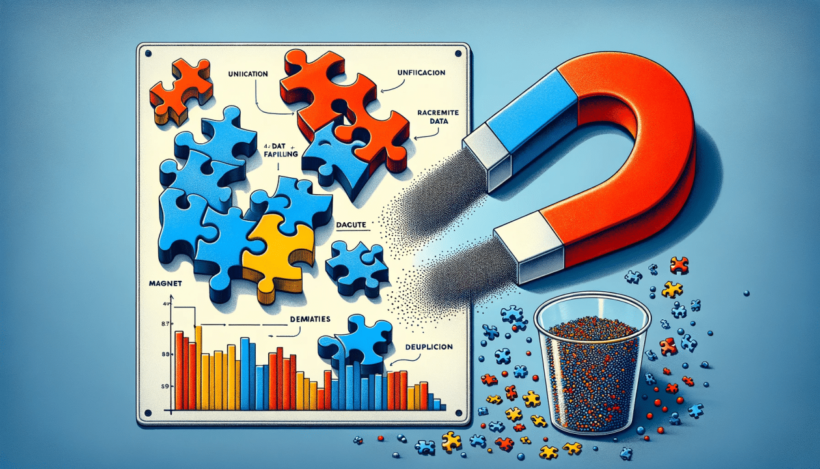Bad Data: How Salesforce Administrators Can Eliminate It
Published by Stephanie Rijks on October 3, 2022
This article will shed light on the key statistics connected to bad data. It will also discuss why businesses should care about data quality in their CRM.
It shouldn’t be a surprise that bad data causes severe impacts on businesses such as decreased productivity, missed opportunities, revenue losses, and damaged brand reputation.
Bad data can be divided into inaccurate, duplicate, and unqualified data. 33% of poor data comes from human error. It is quite a common thing for an SFDC user to miss a phone number, input a wrong email address, or do not recognize the same records. Salesforce claims that in order to ensure good quality of data, users have to spend over 50% of their time on daily data quality checks.
To learn more about the impacts of poor quality data, click here.
Why should you care about data quality in Salesforce?
The State of Salesforce by IBM shows that the 2nd biggest concern among salesforce users is bad data. The report shows an increased demand for relying on data-driven insights, which gives data management a pivotal role.
Key takeaways:
Sales reps: 52% of SFDC customers have a higher demand for data insights of customers’ propensity to buy.
IT and DevOps: 64% ask for more data-driven decision-making tools
Marketers: 65% are keener to have AI for analytics & reporting on customer behavior and target markets.
Service: 69% have a raised demand for AI-driven next-best-action and knowledge assistance

Obviously, businesses should care about data quality within their CRM because there is evidence that poor data negatively impacts organizational performance.
Revenue loss. Ovum’s research posits that around 30% of revenue is lost due to low data quality.
Productivity loss & time waste. Salesforce users waste 20% of their time researching the accounts they want to work with, rather than spending that time on actual selling.
Missed opportunities. Due to the inability to prioritize selling tasks appropriately because of the mundane data quality actions, sales reps could be wasting time on the wrong accounts.
Worsened decisions. Inaccurate reports based on inconsistent data may lead to wrong strategic decisions.
Decrease in user adoption. The less trust in data there is in a CRM, the more decision-makers are willing to switch to another system to keep a track of it. Is there really a need in wasting more time and money on various tools to combat data quality problems?

Who is responsible for data quality in Salesforce?
One may think that it is solely an IT problem to deal with data cleansing or management. As a Salesforce administrator, your job is to clean the database for better performance. Therefore, SFDC admins have to recognize incomplete, inaccurate, and duplicate records. This begs the question then is this the sole responsibility of SFDC admins, or also the sales reps, marketers, and senior managers?
Surely, it should be in everyone’s interest to take care of the data you input to better the sales performance. The GIGO concept confirms this statement by claiming that the garbage will also be the output if the garbage is input.
The more managers look after the accuracy and consistency of their data, the less mundane data tasks will be on Salesforce admins’ shoulders. Steve Jones says, “Data quality isn’t a business outcome. It’s about the business objective that data quality enables.”
Delpha also believes that data quality should not just be an IT-focused problem. The best approach to increase the productivity and adoption of CRMs is to improve data quality by empowering users with an AI solution intelligently. Imagine if every sales rep would enter accurate customer data, every marketer would import the correct leads and every senior decision-maker would take appropriate action. Wouldn’t that increase everyone’s productivity and business profitability?

How do you overcome bad data in Salesforce?
Firstly, start with educating employees on the importance of data quality in your CRM. If each member of the team contributes to data cleansing/management, the performance of the business as a whole will be amazing.
Secondly, set the metrics and track the ROI of your data. How consistent, accurate, old, etc. your SFDC data is? More about the characteristics of data you can read here.
Thirdly, do not disregard using AI solutions. These assistants will help each sales rep, marketer, and SF admin increase their productivity by 40%. AppExchange offers various solutions and extensions helping with the adoption of Salesforce.
One of these human augmentation helpers is Delpha. It aids in detecting inaccurate, duplicate, and incomplete data in Salesforce and recommends the next best actions.
Combat bad data in Salesforce together with Delpha, the best AI solution for data quality and sales efficiency.
Want to learn more about Delpha?






